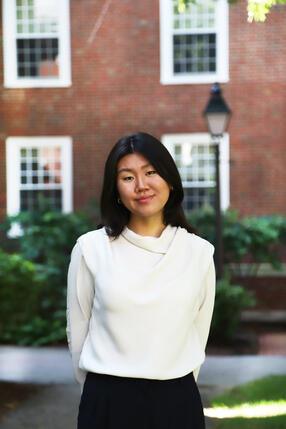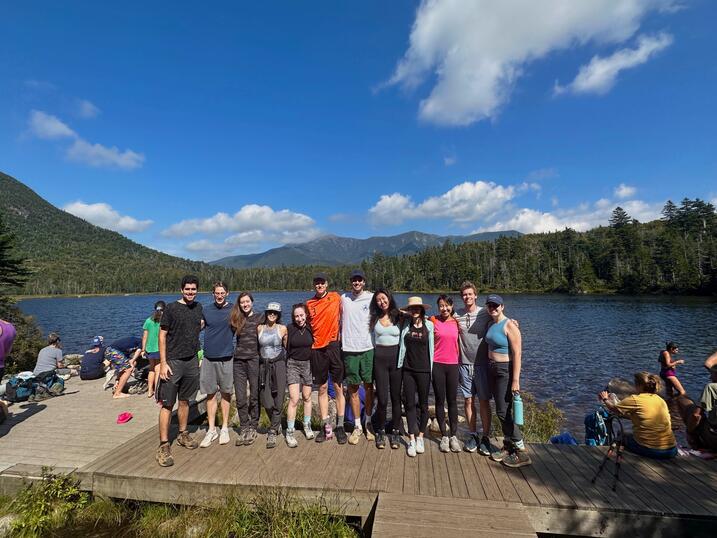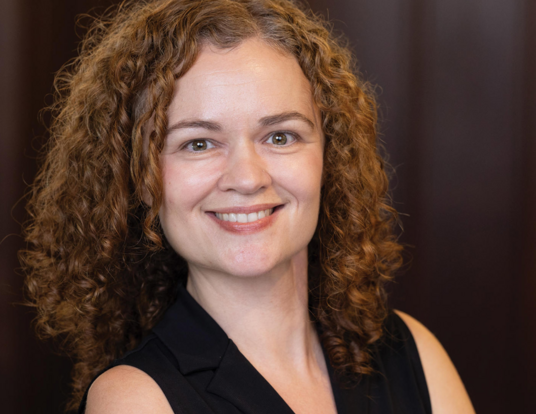Speaking Out on Inequality
Chen combines passion for social change with innovative economics research

Research at Risk: Since World War II, universities have worked with the federal government to create an innovation ecosystem that has yielded life-changing progress. Now much of that work may be halted as funding is withdrawn. Find out more about the threats to medical, engineering, and scientific research, as well as how Harvard is fighting to preserve this work—and the University's core values.
Fiona Chen’s paternal grandfather, Pei Yuan, worked for the town news bulletin in Fujian, China, during the Cultural Revolution of the 1960s and 1970s. One day, he accidentally omitted the word “never” in the Mao Zedong slogan, “Never forget the class struggle.” The honest mistake was interpreted as defaming the government. He was arrested and placed in a re-education camp for several months so that his “negative views” of the government could be “reformed,” with a chilling effect on Chen’s family.
“Even though my grandfather’s mistake wasn’t a political act, I think it scared a lot of my family members away from speaking out against authority figures,” she says. “When I was growing up, I was much the same way—very shy, very obedient.”
Chen doesn’t have trouble speaking out anymore. As an undergraduate student at the Massachusetts Institute of Technology (MIT), she joined the student government and worked with the Institute on complex funding and social issues, including the university’s COVID-19 policies. Now, as a PhD student in economics at the Harvard Kenneth C. Griffin Graduate School of Arts and Sciences (Harvard Griffin GSAS), she combines her passion for social change with the study of labor markets to create new knowledge that can inform the effort to address widening inequality in the US.
Finding Her Voice

Chen developed a concern for economic inequality growing up in Alameda, California, near Oakland and Berkeley. A drive through the Bay Area took her past large encampments of unhoused people just blocks from enormous mansions and luxury high-rise apartments with sky-high rental prices. As a debate coach for high schools around the Bay Area and across the US, Chen observed the same kind of disparities among schools with different levels of funding. “I could see the wide range of expectations that these students had for what their debate careers and college futures would look like,” she says.
Through debate, Chen found her voice. Through connections with activists in her community, she developed an understanding of the ways that inequality was promulgated in the US—and an interest in combatting them.
“One of my best friends from debate did substantial political work advancing gender and racial equity, particularly with her high school and the organization Girl Up,” Chen says. “She wrote a piece for the Huffington Post website supporting her school’s decision to hold a series of educational events about racial inequality on MLK Day.” After a scathing response on the right-wing website, Breitbart.com, Chen says her friend received an abundance of hate—including death threats—over social media and email. “Despite the enormous backlash, she maintained her commitment to this advocacy work. I remember feeling so in awe of her resilience and courage.”
Activism became an integral part of Chen’s identity when she started college at MIT. Chen’s activism found a focus with the onset of the COVID-19 pandemic. A member of MIT’s student government, Chen lobbied the administration to adopt a universal pass/fail grading system in place of the opt-in system the university had originally planned to use. Asserting that an opt-in system was fundamentally inequitable, Chen pointed out that it would negatively affect students who had health issues or difficulty accessing technology and wireless internet service. In response to the advocacy, MIT became one of the first schools to implement a universal pass/fail policy during the pandemic. “Several universities implemented the same policy,” says Chen. “The student government felt so proud of this win, and it provided us quite a lot of energy and momentum to continue advocating for COVID-19 policies that supported students.”
I think any institution should have a clear sense of its values.
—Fiona Chen
Chen also helped MIT draft a values statement in 2020. “I think any institution should have a clear sense of its values,” she says. “We held focus sessions with different stakeholders across the university, and we ended up writing a values statement that I thought was quite substantive and well-tailored to MIT.”
Chen is still deeply involved at MIT. As a recent graduate member of the MIT Corporation, she helps to shape the school’s policy and priorities, its role in combatting climate change, and academia’s relationship to entrepreneurship. Chen says, “I’d gotten some exposure to doing policy work as an undergrad, but not at the same sort of like high-level, birds-eye view that I have now.”
Sleeping on the Job
A background in debate and an investment in social issues did not automatically lead to the study of economics. When considering what career might best support her passion for dismantling income inequality, Chen originally thought about studying housing policy, human rights law, or even sociology. But her fluency in STEM subjects, particularly mathematics, led her to take an economics class in high school and pursue a form of debate that focused on economics policy.
“I’ve always been drawn to numbers—I participated in many math competitions while growing up, and math was always my favorite subject in school,” Chen says. “Simultaneously, I sought out an application for the mathematical skills I was developing. I felt like economics was a perfect fit—it provides a framework and toolkit for technically and rigorously studying complex social issues.”
Chen dove into economics research in her first semester at MIT. Associate Professor Frank Schilbach, PhD ’15, hired her to analyze and graphically display datasets gathered by a team of researchers investigating the effects of sleep deprivation on labor outcomes in Chennai, India, a city of 6.5 million people whose slumber is routinely disrupted by noise, light pollution, and uncomfortable sleeping conditions.
“Fiona’s tasks included checking new data sources for consistency, conducting literature reviews of the economic and behavioral impacts of sleep, and performing sophisticated causal analyses of various outcome measures in our study, including decision-making and cognitive performance,” says Schilbach.
The research team provided study participants with incentives either to sleep a greater amount of time at night or to nap during the day at their workplace in a more controlled environment. To Chen’s surprise, they found that those who had extra time to rest overnight did not improve their productivity at work. The problem was sleep efficiency. With the city’s many disruptions, more hours didn’t translate to deeper sleep. Meanwhile, the participants who napped during the day under better conditions were more productive.
The experience exposed Chen to the realities of conducting a large research study—from recruiting and retaining participants to running a large team of data researchers to ethics compliance, interpreting messy data, and surprising outcomes. “The opportunity gave me insight into the research process,” she says. “It made me believe that I could pursue a PhD in economics.”

For a More Equitable World
Chen remains invested in illuminating the factors that affect people’s careers, income, and well-being, now focusing on labor and public economics for her PhD at Harvard Griffin GSAS. Now in her third year, Chen’s research, affiliated with the Opportunity Insights lab of Professor Raj Chetty, PhD ’03, focuses on the way that the labor market shapes inequality and economic opportunity.
“I look at how public policies can amplify or rectify patterns of inequality—for example, the way people search for, apply to, and negotiate over jobs,” she says. “I want to know whether people search for jobs differently based on their economic background and other factors, and whether there are ways that we can improve institutional structures—such as the way that job search platforms are built, or companies’ hiring policies, or labor market regulations—to avoid exacerbating inequality.”
One of Chen’s faculty advisors, Robert C. Waggoner Professor of Economics Amanda Pallais, describes how Chen’s research addresses one important example of labor inequality. “In a project with her classmate Jimmy Stratton, [Chen] hypothesizes that the way the job search process is designed may hurt workers from traditionally disadvantaged groups. For example, single mothers may be particularly interested in work-from-home options but afraid to ask about them because they don’t want to be discriminated against.”
Research like the work Fiona is pursuing is very valuable for grounding policy discussion in facts and analysis.
—Professor Jesse Shapiro, PhD ’05
As an outlier in inequality metrics like the Gini coefficient—the share of income held by the top 1 percent—the United States is a key site for Chen’s research. “Inequality is growing at such an alarming rate over the past few decades,” she says. “There are profound implications for the resources and opportunities people can access, what political power they hold, and much more. I think labor economics is quite powerful for studying one piece of the puzzle—the factors that led to the emergence of this inequality. To what extent is it driven by technological innovation and the displacement of jobs as a result? To what extent is it driven by changes to the tax code? To what extent is it driven by trade or outsourcing? All these factors affect the labor market.”
Also one of Chen’s faculty advisors, Gund Professor of Economics and Business Administration Jesse Shapiro, PhD ’05, agrees. “The field of economics provides a toolkit for understanding the causes and consequences of changes in important markets such as labor markets, and also for evaluating and predicting the effects of policy interventions,” he says. “Research like the work Fiona is pursuing is very valuable for grounding policy discussion in facts and analysis.”
Grounding policy in fact is Chen’s great vision for her work—second only to effecting real change. “I hope that the work I do can inform different policies, from private companies’ hiring practices to job search platforms’ features,” she says. “I hope my research will inform the way that institutions think about the effects of their policies on marginalized populations, such that we can move towards a more economically equitable world.”
Get the Latest Updates
Join Our Newsletter
Subscribe to Colloquy Podcast
Simplecast



